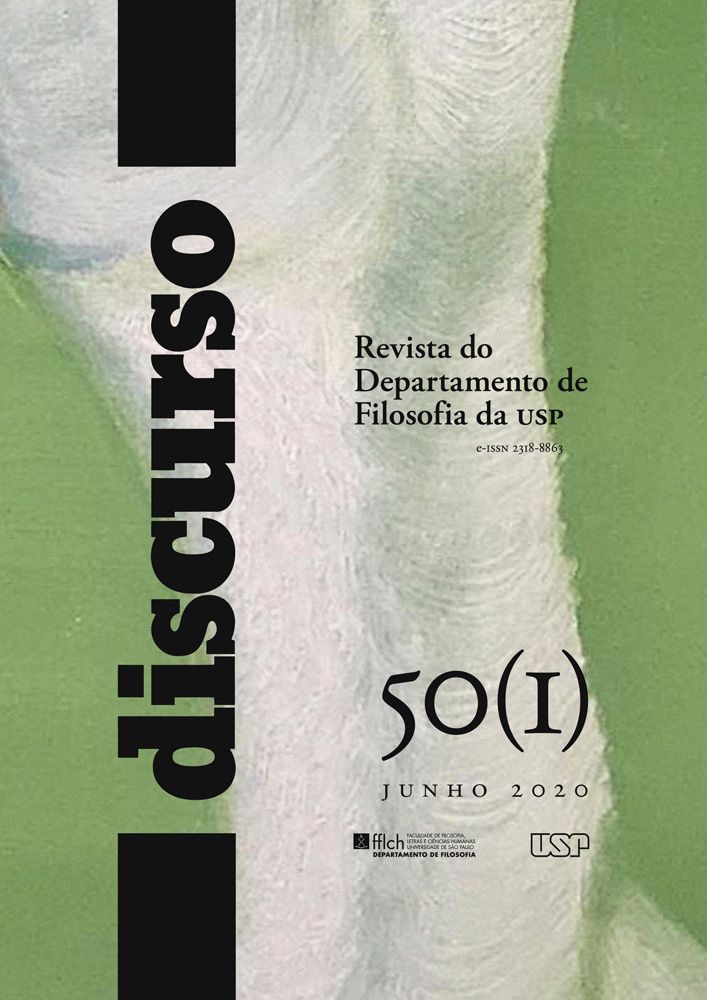Conscience and Feeling in Rousseau’s 'Émile'
DOI:
https://doi.org/10.11606/issn.2318-8863.discurso.2020.171578Keywords:
Empiricism, Physiology, Innatism, Mechanism, ReligionAbstract
This article examines the idea of conscience in J.-J. Rousseau’s Émile from a perspective that combines History of Philosophy and Lexical History. The analysis is contextualized in relation to other writings of the author, especially the Discours sur l’origine de l’inégalité, and within the historical framework of sciences in 17th and 18th centuries, with attention to John Locke’s empiricist theory. It intends to investigate the semantic constitution process of “conscience” and “sentiment intérieur” in French language considering certain debates involving Innatism and Mechanism, with emphasis to the contribution of the Cartesian physician Louis de la Forge. The aim of this work is to show the ways in which the idea of conscience in Émile, combined with an interpretation of the inner sentiment associated with Cartesian physiology, establishes significant pillars for the mental and institutional structures that made possible the emergence of what came to be called Modern Subjectivity.
Downloads
References
Cassin, B. (Dir.) (2004). Vocabulaire européen des philosophies. Paris: Seuil.
Clarke, D. M. (1989). Occult Powers and Hypotheses: Cartesian Natural Philosophy under Louis XIV. Oxford University Press.
Donatelli, M. C. O. (2011). “Descartes e Louis de la Forge: o mecanicismo na descrição do corpo humano e a questão da sensação”. In: Menezes, E.; Oliveira, E. (Org.). Modernidade filosófica: um projeto, múltiplos caminhos. São Cristóvão: Ed. UFS.
Elias, N. (1994). O processo civilizador, I: uma história dos costumes. 2ª ed. Trad. R. Jungmann. Rio de Janeiro: Jorge Zahar.
Ernoult, A.; Meillet, A. (Ed.) (2001). Dictionnaire étymologique de la langue latine : histoire des mots. 4a ed. Paris: Klincksieck.
Gouhier, H. (1970). Les Méditations métaphysiques de Jean-Jacques Rousseau. 2ª ed. rev. Paris: J. Vrin.
Guichet, J.-L. (2006). Rousseau, l’animal et l’homme : l’animalité dans l’horizon anthropologique des Lumières. Paris: CERF.
Jimack, P. D. (1960). La Genèse et la rédaction de l’Émile de J.-J. Rousseau : étude sur l’histoire de l’ouvrage jusqu’à sa parution. Genève: Institut et Musée Voltaire.
Kant, I. (1994). Remarques touchant les observations sur le sentiment du beau et du sublime. Trad. B. Geonget. Paris: J. Vrin.
Kawauche, T. (2018). “Medicina e educação no século XVIII: Rousseau inventor de Emílio”. Educação e Filosofia (UFU), v. 32, n. 65.
Kawauche, T. (2019a). “Ciência e direito no contratualismo moderno: o caso Rousseau”. In: Façanha, L. S.; Carvalho, Z. J. V. (Org.). Rousseau, Kant & diálogos. São Luís: Ed. UFMA.
Kawauche, T. (2019b). “Consciência e justiça em Rousseau: dos tratados de casuística ao tribunal interior”, Dois Pontos (UFPR), v. 16, n. 1.
Kawauche, T. (2019c). “Ordenar as paixões: reconhecimento e sociabilidade no Emílio de Rousseau - Primeira parte”, Dialectus (UFC), ano 8, n. 15.
Kontic, S. Z. (2018). “Cogito, sentimento e afetividade em Malebranche”, Kriterion (UFMG), n. 140.
La Forge, L. (1666). Traité de l’esprit de l’homme, de ses facultés & fonctions, & de son union avec le corps, suivant les principes de René Descartes. Amsterdam.
Leites, E. (1988). “Casuistry and character”. In: Le Forge, L. (Org.). Conscience and Casuistry in Early Modern Europe. Cambridge University Press.
Locke, J. (1972). Essai philosophique concernant l’entendement humain. Trad. P. Coste. Ed. E. Naert. Paris: J. Vrin.
Locke, J. (1975). An Essay concerning Human Understanding. Ed. P. H. Nidditch. Oxford University Press.
Malebranche, N. (2004). A busca da verdade: textos escolhidos. Trad. P. J. Smith. São Paulo: Discurso Editorial.
Maruyama, N. (2000). “Rousseau e Helvétius: os princípios da moralidade”, Cadernos de Ética e Filosofia Política (USP), n. 2.
Maruyama, N. (2001). A contradição entre o homem e o cidadão: consciência e política segundo J.-J. Rousseau. São Paulo: Humanitas.
Olaso, E. (2011). “Os dois ceticismos do Vigário Saboiano”, Sképsis, ano IV, n. 6.
Radica, G. (2008). L’Histoire de la raison : anthropologie, morale et politique chez Rousseau. Paris: Honoré Champion.
Rousseau, J.-J. (1964). Œuvres complètes, t. III. Ed. M. Raymond & B. Gagnebin. Paris: Gallimard (Col. “Bibliothèque de la Pléiade”).
Rousseau, J.-J. (1969). Œuvres complètes, t. IV. Ed. M. Raymond & B. Gagnebin. Paris: Gallimard (Col. “Bibliothèque de la Pléiade”).
Souza, M. G. (2000). “O Cético e o Ilustrado”, Cadernos de Ética e Filosofia Política (USP), n. 2.
Taylor, C. (1989). Sources of the Self: The Making of the Modern Identity. Cambridge: Harvard University Press.
Voltaire. (1771). Questions sur l’Encyclopédie par des amateurs, IV. Genève.
Voltaire. (1973). Voltaire. São Paulo: Abril (Col. “Os Pensadores”).
Downloads
Published
Issue
Section
License
O trabalho da Discurso foi licenciado com uma Licença Creative Commons Attribution-NonCommercial-ShareAlike 4.0 International.
Os autores aqui publicados mantém os direitos sobre seus artigos
De acordo com os termos seguintes:
-
Atribuição [BY] — Deve-se dar o crédito apropriado, prover um link para a licença e indicar se mudanças foram feitas.
-
NãoComercial [NC] — É proibido o uso deste material para fins comerciais.
-
CompartilhaIgual [SA] — Caso haja remixagem, transformação ou criação a partir do material, é necessário distribuir as suas contribuições sob a mesma licença que o original.




